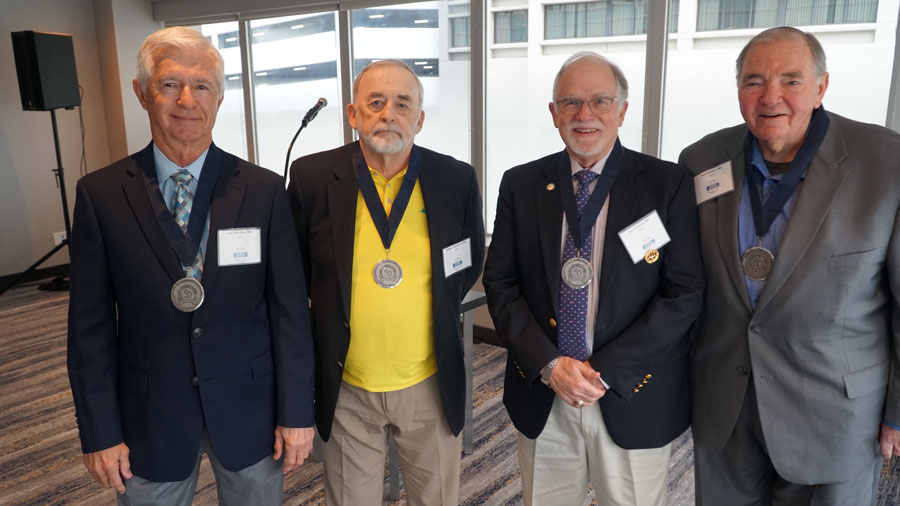First 50th Reunion

The world, the Texas Medical Center, and McGovern Medical School looked completely different in 1973. Richard Nixon was president, a gallon of gasoline cost an average of 39 cents, The Godfather won the Academy Award for Best Picture, and the inaugural class of McGovern Medical School walked the stage for commencement.
When the Class of 1973 entered McGovern, the Medical School was known as the UT Houston Medical School, and the degree program lasted just three years instead of four.
Additionally, the Medical School Building we know today was merely a project for the future. In fact, there was no building at all for the medical students at the start of their curriculum. With no home of their own, McGovern students were distributed across other medical schools in The University of Texas System, including schools in Galveston, Dallas, and San Antonio, where they studied for two years before returning to Houston upon completion of the John H. Freeman Building in 1972.
In December 1973, 22 medical students — 19 from the original inaugural class and three transfers — became the first graduates of what is now McGovern Medical School. Fifty years later, four members of that inaugural class, who paved the road for each of the 8,500 alumni who have since graduated from the Medical School, returned to campus as part of the annual Alumni Weekend, March 23-25.
The returning members from the 1973 class, which included Gary Heaton, MD; Asa Lockhart, MD; Jon Schreiber, MD; and Warren Redmond, MD, joined fellow McGovern Medical School alumni for a weekend of festivities, highlighted by the Half Century Society Luncheon, honoring the graduates from 50 years ago.
At the luncheon, each of the returning members shared stories and memories from five decades ago. They recalled not only how small their class had been compared to the 240 McGovern students who graduated in the Class of 2023, but also how small the faculty had been. Despite the limited number of faculty, however, Heaton remembered they worked closely and built wonderful experiences in their training.
“These were wonderful experiences, and I thought that I was taught very well,” Heaton said. “When I started as a resident, there was one resident and then other fellows from the Baylor College of Medicine Department of Pediatrics in the evenings. They were really wonderful and personal experiences getting to work closely with the faculty.”
Lockhart shared Heaton’s sentiments of being close to the faculty and took it a step further in remembering the close relationships with department chairs that the group was able to develop. He recalled a comical story of taking his internal medicine final, in which he was being extremely thorough.
“I spent my first two years at UT Southwestern, which had a reputation at the time for being pretty competitive. It was not uncommon for somebody to give you wrong information so they do a little bit better than you,” he said. “The final was an essay, and Dr. (Walter) Kirkendall is chair of the department. There were six or eight questions, and a lot of other folks had finished. And it was pass-fail, and he looked over and said, ‘I think you pretty well got it, and if you don’t leave now, it is pass-fail, and I am going to fail you. I’m ready to go home.’”
Along with the great relationships he had, he also remembered some of the amazing opportunities that were afforded to him through his time in medical school, including the first international rotation with what was UT Houston at the time, where he was able to escape the Yom Kippur War by just a few days.
Redmond said that 50 years later, his memories of school, residency, and clinical rotations are all a blur, but what he got the most out of his time at McGovern Medical School was what he learned about himself.
Some of the valuable lessons he learned were that you cannot take yourself or medicine too seriously and that it was better to be rich and healthy than to be poor and sick. He also joked that they learned that if you can remain calm and collected while all those around you are losing their heads, possibly you don’t understand the situation and that “the patient will tell you that they know you think you understand what you thought they said, but they’re not sure you realize what you heard is not what they meant.”
One of the most prominent figures that each of the four members mentioned having an impact on their lives and their careers was Dr. James “Red” Duke. Like the inaugural graduating class, Duke officially joined the Medical School in 1972 and in his tenure introduced Memorial Hermann’s Life Flight program, brought a Level 1 Trauma Unit to Houston, and hosted a series of nationally syndicated television spots called “Texas Health Reports,” which were viewed by millions of people.
Yet, though he seemed larger than life to some, students at McGovern Medical School at the time were able to work right alongside him. Of course, Schreiber remembered some of his physical attributes like his “gigantic mustache” and his hat, but he also remembered getting to do surgery with Duke as well.
“We did a gallbladder one night at about 12 o’clock, and I got to hold the liver up for five hours,” Schreiber said jokingly. “You’d start to fall asleep in the middle of it, and he’d jolt you awake with his elbow. There were some pretty well-known professors here.”
Since 1973, a lot has changed over the last five decades. Graduating classes are bigger, the curriculum is a year longer, and the faculty has increased tenfold. However, despite all the changes at McGovern Medical School, Schreiber said that he notices one constant: “Though the years have changed, one thing remains the same: the commitment to excellent leaders in education.”